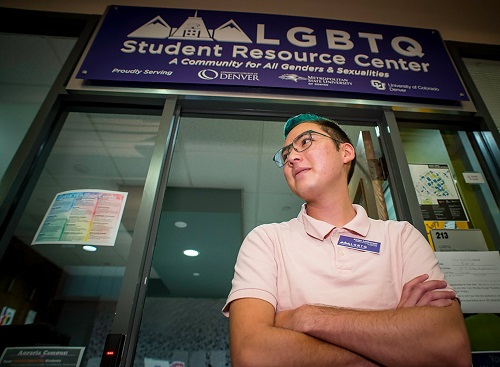Early Bird
Autism, gender identity and higher ed
To observe Autism Acceptance Month, the Early Bird is highlighting student stories and insights.
April 20, 2021
 To honor Autism Acceptance Month, the Metropolitan State University of Denver Access Center and the Department of Speech, Language, Hearing Sciences have collaborated in developing a series of short articles on autism.
To honor Autism Acceptance Month, the Metropolitan State University of Denver Access Center and the Department of Speech, Language, Hearing Sciences have collaborated in developing a series of short articles on autism.
This month, the Early Bird will highlight the experiences and perspectives of three autistic Roadrunners. This week, alum Kaiba Linthicum reflects on the intersectionality between autism and gender identity. Linthicum (pictured) earned a degree in Psychology at MSU Denver and is pursuing a Doctor of Psychology degree at the University of Colorado Denver.
Early Bird: Thanks for sharing your story, Kaiba. What would you like your fellow Roadrunners to understand about your experience with autism and your gender-identity journey?
Linthicum: I identify as a transgender masculine person, and I’m queer. I am also autistic. Growing up, I never felt like a girl, but I also never felt like a boy. My relationship to gender wasn’t typical. I felt like gender was just a descriptor for people – something attached. It wasn’t until my teens when I realized that I, too, have a gender and that people place a lot of importance on it. My autism is pervasive in how I relate to everything; my brain is autistic, and how I navigate and interact with the world is autistic too, including how I experience gender.
In some ways, this has freed me from the constraints that gender places on people. However, this has also challenged me in understanding why gender is so important and, more importantly, how I present and interact with others. Some people discredit my relationship to gender and my transition based on being autistic. Some people think that I am incapable and therefore I cannot understand my gender. Just because I happen to understand gender differently does not mean I am incapable. Everyone has a different understanding and relationship to gender, so must my experience be the wrong one?
Early Bird: How can MSU Denver build a campus community that is more inclusive of students with autism and of students who identify as LGBTQIA?
Linthicum: When people ask me about LGBTQ+ issues or about autism, I get the feeling that they do not want to offend me. And while I respect that, I find it tiresome. My advice is to treat people with respect and to treat them as an individual. But understand that there will be misunderstandings and be willing to communicate about them in a clear and direct manner. Try to become comfortable with the fact that you will mess something up, whether it be terminology, a misunderstanding or just lacking the knowledge on autism or LGBTQ+ issues. Be open to hearing someone out, try to listen and be nonjudgmental and ask questions with the intent of understanding.
Know that how you experience the world is not the only way and that there is no right way to experience life. I have had encounters with people who believe that being transgender and/or autistic is tragic, obscene or impossible. The real tragedy is when people who have atypical brains and atypical experiences of gender are deemed unworthy of respect, dehumanized and marginalized by an intolerant society.
Thank you again to Kaiba Linthicum, and look for more student insights next week.
Topics: Academics, Access, Diversity, Inclusion, Student Success
Edit this page